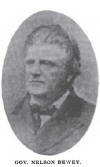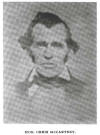|
EARLY HISTORY AND GROWTH
Captain Shaw
landed at this place in 1816, as mentioned on page 9.
Thomas Hymer, afterward of Potosi, on his return
from a trip to the Selkirk settlement stopped at
this place in 1824, occupying an old cabin, probably
built by a French trader. Levi Gilbert came
to the place in 1827 and has stated that Judge Sawyer
put up a furnace there that year, and was to give a free
Fourth of July dinner, but hearing of the Indian
troubles, he left July 3. The same year Orris
McCartney and Alexander D. Ramsey came and
settled a few miles from the village, where they opened
farms. The next spring McCartney went to
Beetown and spent a few months there and then returned
to his farm. A. K. Barber and Woodward
Barber also came in 1827. Thomas G. Hawley
is credited with building the first house in the new
village. Henry Hodges and Thomas Shanley
came in 1828, but did not stay long. They are said
to have built a log warehouse.
Nothing further can be learned of the young settlement
until 1831, when Glendower M. Price, a young man
of considerable means, came there from Philadelphia with
his newly married wife and opened a store in a log
building on the river bank, on the site of Grimm's
warehouse. When the Black Hawk War broke out
Price, with his young wife, held his position,
improvised a fort out of a large log house, raised a
company of scouts from the refugee miners and commanded
them, and after the war was always called Major.
Sometimes in his absence his wife commanded the refugees
and friendly Indians at the fort, being called
Captain Price.
In 1834 Benjamin F. Forbes, afterward
postmaster at Lancaster, came to Cassville. His
wife was a sister of Major Price's wife.
About the time of Major Price's coming Daniel
Barber, Henry Lander, Isaac Lander, Richard Ray, and
William W. Wyman came. Isaac Lander
preempted land at the mouth of the hollow, Ray
took up the southwest quarter of Section 20, and Price
Section 29. The land, however, did not come into
market until 1834.
Wisconsin was made a territory July 4, 1836, taking in
all the present States of Wisconsin, Iowa, and
Minnesota, and part of the Dakotas. Months before
the bill passed and was approved by the President
persons in the East pitched upon Cassville as an
eligible and central location for the capital of the new
territory, and laid out a city here, buying the claims
of Price and Ray, except three lots
reserved by Price. The new town company was
composed of Garrett V. Denniston, a lawyer of
Albany, New York, and Lucius Lyon, who had been
Surveyor-General of Michigan Territory. There may
have been others in the company, but no other names
appear as grantors on the records of deeds to the lots
sold by the company. The company immediately began
the erection of a mammoth brick hotel, five stories
high, which was to shelter the legislators and State
officials to-be. Daniel Banfill, afterward
a Lancaster landlord and contractor for the shoddy
court-house of 1837, appears to have been the
contractor. It cost $45,000. But before the
great building was completed, or nearly completed, the
great fight for the location of the capital was over and
Cassville had lost, and the "big brick" long stood with
lonely halls and vacant rooms, a monument to blighted
hopes and failing ventures.
In the debate in the first territorial legislature of
Wisconsin on the location of the capital Col. Wm. S.
Hamilton said:
"Cassville stands on the east bank of the Mississippi,
surrounded by very pretty scenery. The eye can
rest on the soft and soothing, the grand and sublime.
There will be found everything necessary for the
promotion of man's comfort and the exercise of his
energies. In a word, nature has done all in her
power to make it one of the most delightful spots in the
far West."
 Nelson Dewey came to 1836 as clerk for the town
company. Writing in 1887, he thus describes early
buildings and builders of Cassville: "Daniels,
Denniston & Co. built in 1836 the two houses in
which G. Prior and F. M. Cronin now live.
Clovis A. Lagrave and Charles L. Lagrave
built in 1836 the present frame building adjoining
Geiger's brick store, and Charles Bensill in
1836 built the now old building on the alley on Block
11. G. M. Price in 1836 built the building
now owned by Holloway Stephens on Lot 11, Block
3. It was originally built on Lot 10, Block 11,
and Ezra and John Gleason kept store in it in
1837 and 1838. The latter died in Prairie du Chien.
The former was living in Chicago when I last heard of
him. Charles L. Lagrave now lives in
Minneapolis and Clovis A. Lagrave lives in
California."
Nelson Dewey came to 1836 as clerk for the town
company. Writing in 1887, he thus describes early
buildings and builders of Cassville: "Daniels,
Denniston & Co. built in 1836 the two houses in
which G. Prior and F. M. Cronin now live.
Clovis A. Lagrave and Charles L. Lagrave
built in 1836 the present frame building adjoining
Geiger's brick store, and Charles Bensill in
1836 built the now old building on the alley on Block
11. G. M. Price in 1836 built the building
now owned by Holloway Stephens on Lot 11, Block
3. It was originally built on Lot 10, Block 11,
and Ezra and John Gleason kept store in it in
1837 and 1838. The latter died in Prairie du Chien.
The former was living in Chicago when I last heard of
him. Charles L. Lagrave now lives in
Minneapolis and Clovis A. Lagrave lives in
California."
A correspondent of the New York Commercial
Advertiser, under date of June 20, 1836, gave this
glowing description of Cassville.
"This town is situated on the east bank of the
Mississippi River five hundred miles above St. Louis,
forty-five by land above Galena, and about the same
distance below the mouth of the Wisconsin River.
The site is upon a beautiful prairie, twelve or fifteen
feet above high water-mark at the shore, and extending
back five hundred yards, ascending in this distance
eight feet to a precipitous bluff two hundred feet high
The prairie is about four miles long, slightly broken by
ravines above and below the town plat; but the plat
itself is of so uniform a surface as not to require the
cost of a dollar to grade either a building lot or a
street. The plat is four hundred yards wide, by
eleven hundred and ninety long, or nearly one-fourth of
a mile by two thirds of a mile. In this bluff,
about fifty feet above the surface of the plain below,
are two hold springs, which discharge water enough to
supply a population of ten thousand.
MORE TO COME UPON REQUEST
TOWN OFFICERS
VILLAGE OFFICERS
NEWSPAPERS
The
Cassville Current. - This paper was started Dec. 12,
1886. Walter W. Pollock was editor and
publisher. It was a six column folio. The
typography was of unusual excellence for a country
paper. It was printed at the Teller office
in Lancaster. Although not printed at home, it
fully covered the field of Cassville local news and
interests. It was published about a year, when the
publisher found a more inviting field and the paper was
discontinued.
The Cassville Index. - This paper was first
issued Mar. 8, 1888, by Charles DeWitt and his
wife, formerly Mrs. Lou P. Lesler. Both had
formerly been publishers of the Boscobel Dial.
The paper was an eight-column folio. In August,
1889, John Foley became the publisher and has
conducted it ever since. It is Populist in
politics. As a local paper it is a credit to the
village in which it is published.
CHURCHES
SOCIETIES
SCHOOLS
BIOGRAPHICAL
 A prominent figure in the early history of Cassville was
Orris McCartney. He was born in Harford,
New York, May 9, 1794. At the age of seven, his
mother dying, he went to live on the farm of his uncle
near Cooperstown and afterward lived with his sisters.
In the War of 1812 he enlisted in Captain Gideon
Orton's company and went to Plattsburg, arriving the
day after the battle there. In 1817 he came west,
stopping a year or two in Ohio and several years in
Illinois, where he married Miss Eliza Barber.
In 1827 he came to the lead mines with Major Rountree,
locating at Cassville and Beetown, as before stated.
He was for a short time one of the owners of the famous
"Bee Land," but traded his interest for a six-horse team
and returned to his farm near Cassville. In the
Indian troubles of 1832 he sent his family to
Jacksonville, Ill., for safety.
A prominent figure in the early history of Cassville was
Orris McCartney. He was born in Harford,
New York, May 9, 1794. At the age of seven, his
mother dying, he went to live on the farm of his uncle
near Cooperstown and afterward lived with his sisters.
In the War of 1812 he enlisted in Captain Gideon
Orton's company and went to Plattsburg, arriving the
day after the battle there. In 1817 he came west,
stopping a year or two in Ohio and several years in
Illinois, where he married Miss Eliza Barber.
In 1827 he came to the lead mines with Major Rountree,
locating at Cassville and Beetown, as before stated.
He was for a short time one of the owners of the famous
"Bee Land," but traded his interest for a six-horse team
and returned to his farm near Cassville. In the
Indian troubles of 1832 he sent his family to
Jacksonville, Ill., for safety.
In 1840 his wife died and in 1844 he married Mrs.
Monse, sister of Benjamin Kilbourn, of
Jamestown. She died Apr. 24, 1887, in her 79th
year. Mr. McCartney died at his homestead
in Cassville Apr. 16, 1868. Four of his children
survive: William F. and Alex. R., at
Denver, Colorado, Henry L., at Garden City,
Kansas, and Mrs. Harriet Liscomb at Cassville.
Mr. McCartney was one of the commissioners to
locate the county seat, the first treasurer of Grant
County, and held many other offices, as may be seen by
looking over the rosters of officers in this work.
|